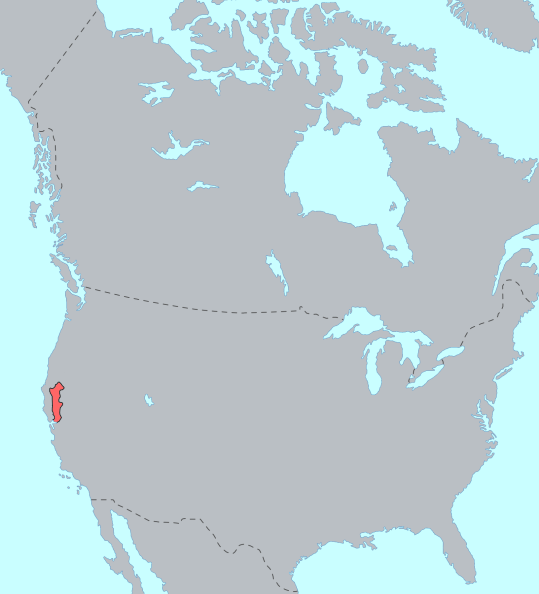Recent from talks
Nothing was collected or created yet.
Wintuan languages
View on Wikipedia| Wintun | |
|---|---|
| Copeh | |
| Geographic distribution | California |
| Ethnicity | Wintun people |
| Linguistic classification | Penutian ?
|
Early form | Proto-Wintuan
|
| Subdivisions |
|
| Language codes | |
| Glottolog | wint1258 |
 Pre-contact distribution of Wintuan languages | |
Wintuan (also Wintun, Wintoon, Copeh, Copehan) is a family of languages spoken in the Sacramento Valley of central Northern California.
All Wintuan languages are either extinct or severely endangered.
Classification
[edit]Family division
[edit]William F. Shipley listed three Wintuan languages in his encyclopedic overview of California Indian languages.[1] More recently, Marianne Mithun split Southern Wintuan into a Patwin language and a Southern Patwin language, resulting in the following classification.[2]
- Wintuan
- Northern Wintuan
- Southern Wintuan
- Patwin (a.k.a. Patween)
- Southern Patwin †
Wintu became extinct with the death of the last fluent speaker in 2003.[3] As of 2010[update], Nomlaki has at least one partial speaker.[3] One speaker of Patwin (Hill Patwin dialect) remained in 2003.[4] Southern Patwin, once spoken by the Suisun local tribe just northeast of San Francisco Bay, became extinct in the early 20th century and is thus poorly known.[5][2] Wintu proper is the best documented of the four Wintuan languages.
Pitkin estimated that the Wintuan languages were about as close to each other as the Romance languages.[6] They may have diverged from a common tongue only 2,000 years ago. A comparative study including a reconstruction of Proto-Wintuan phonology, morphology and lexicon was undertaken by Shepherd.[7]
Possible relations to external language families
[edit]The Wintuan family is usually considered to be a member of the hypothetical Penutian language phylum[8] and was one of the five branches of the original California kernel of Penutian proposed by Roland B. Dixon and Alfred L. Kroeber.[9][10] However, recent studies suggest that the Wintuans independently entered California about 1,500 years ago from an earlier location somewhere in Oregon.[11] The Wintuan pronominal system closely resembles that of Klamath, while there are numerous lexical resemblances between Northern Wintuan and Alsea that appear to be loans.[12][13][14]
References
[edit]- ^ Shipley 1978, p. 89.
- ^ a b Mithun 1999.
- ^ a b Golla 2011, p. 143.
- ^ Golla 2011, p. 145.
- ^ Golla 2011, p. 146.
- ^ Pitkin 1984.
- ^ Shepherd 2006.
- ^ Golla 2011, pp. 128–168.
- ^ Dixon & Kroeber 1913a.
- ^ Dixon & Kroeber 1913b.
- ^ Golla 2007, pp. 75–78.
- ^ Golla 1997.
- ^ DeLancey & Golla 1997.
- ^ Liedtke 2007.
Bibliography
[edit]- DeLancey, Scott; Golla, Victor (1997). "The Penutian hypothesis: Retrospect and prospect". International Journal of American Linguistics. 63: 171–202. doi:10.1086/466318.
- Dixon, Roland B.; Kroeber, Alfred L. (1913a). "New linguistic families in California". American Anthropologist. 15 (4): 647–655. doi:10.1525/aa.1913.15.4.02a00050.
- Dixon, Roland B.; Kroeber, Alfred L. (1913b). "Relationship of the Indian languages of California". Science. 37 (945): 225. Bibcode:1913Sci....37..225D. doi:10.1126/science.37.945.225. PMID 17796266.
- Golla, Victor (1997). "The Alsea-Wintu connection". International Journal of American Linguistics. 63: 157–170. doi:10.1086/466317.
- Golla, Victor (2007). "Linguistic Prehistory". In Jones, Terry L.; Klar, Kathryn A. (eds.). California Prehistory: Colonization, Culture, and Complexity. New York: Altamira Press. pp. 71–82. ISBN 978-0-7591-0872-1.
- Golla, Victor (2011). California Indian languages. Berkeley: University of California Press. ISBN 978-0-520-26667-4.
- Liedtke, Stefan (2007). The Relationship of Wintuan to Plateau Penutian. LINCOM studies in Native American linguistics. Vol. 55. Munich: Lincom Europa. ISBN 978-3-89586-357-8.
- Mithun, Marianne (1999). The languages of Native North America. Cambridge: Cambridge University Press. ISBN 0-521-23228-7.
- Pitkin, Harvey (1984). Wintu grammar. University of California publications in linguistics. Vol. 94. Berkeley: University of California Press. ISBN 0-520-09612-6.
- Shepherd, Alice (2006). Proto-Wintun. University of California publications in linguistics. Vol. 137. Berkeley: University of California Press.
- Shipley, William F. (1978). "Native Languages of California". In Sturtevant, William C.; Heizer, Robert F. (eds.). Handbook of North American Indians. Vol. 8: California. Washington, DC: Smithsonian Institution. pp. 80–90. ISBN 0-16-004578-9.
Further reading
[edit]- Dixon, Roland B.; Kroeber, Alfred L. (1903). "The native languages of California". American Anthropologist. 5: 1–26. doi:10.1525/aa.1903.5.1.02a00020.
- Dixon, Roland B.; Kroeber, Alfred L. (1919). "Linguistic families of California". University of California Publications in American Archaeology and Ethnology. 16. Berkeley: University of California: 47–118.
- Grant, Anthony (1997). "Coast Oregon Penutian". International Journal of American Linguistics. 63: 144–156. doi:10.1086/466316.
- Pitkin, Harvey (1985). Wintu dictionary. University of California publications in linguistics. Vol. 95. Berkeley: University of California Press. ISBN 0-520-09613-4.
- Schlichter, Alice (1981). Wintu Dictionary (Report). Survey of California and Other Indian Languages. Vol. 2. Berkeley: University of California.
- Shepherd, Alice (1989). Wintu texts. Berkeley: University of California Press. ISBN 0-520-09748-3.
- Whistler, Kenneth W. (February 19–21, 1977). "Wintun Prehistory: An Interpretation based on Linguistic Reconstruction of Plant and Animal Nomenclature". Proceedings of the Third Annual Meeting of the Berkeley Linguistics Society. 3. Berkeley: 157–174. doi:10.3765/bls.v3i0.3287.
- Whistler, Kenneth W. (1980). Proto-Wintun kin classification: A case study in reconstruction of a complex semantic system (PhD thesis). Berkeley: University of California.

